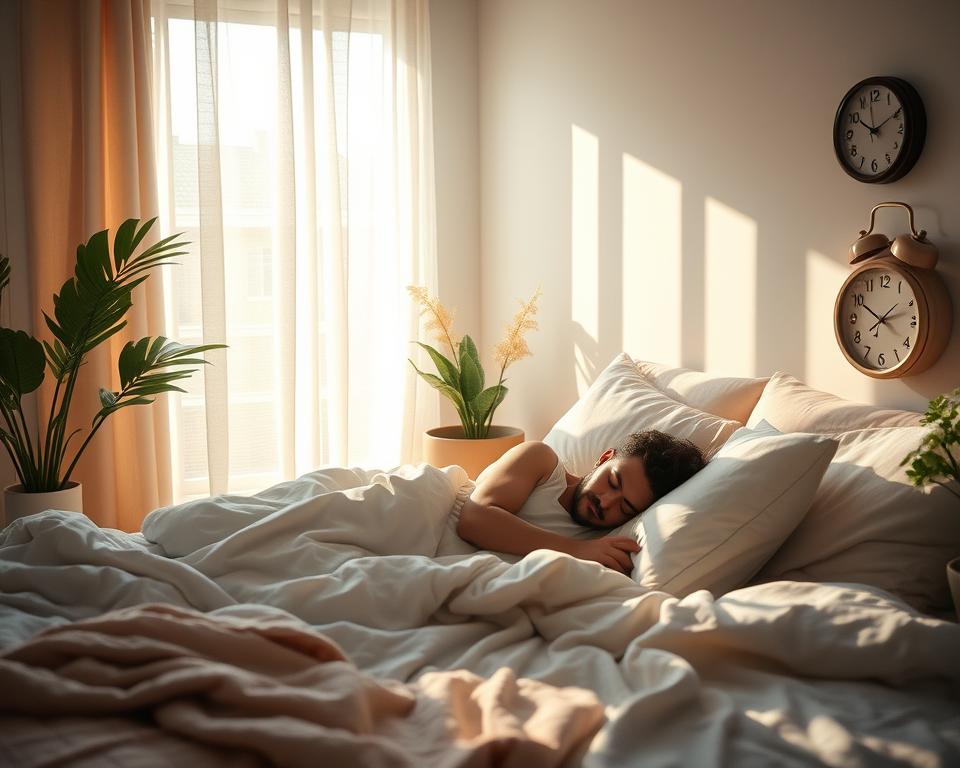Sleep is key to our health and happiness, but many ignore its value. This piece looks into how getting enough sleep helps us. It covers how sleep boosts our brain and immune system, affecting our body and mind deeply.
Studies show that enough sleep is vital for our health. It helps control our body’s processes, like hormone levels and cell repair. By learning how sleep affects health, we see how it keeps us well.
This article concludes that sleep is crucial for staying healthy. It talks about fixing sleep issues like not getting enough rest and bad sleep habits. By knowing how to improve sleep, people can make better choices for their health. This knowledge helps us see sleep as a key part of living well.
Read more interesting information at ::lansdowne-moody
The Importance of Getting Enough Sleep
Sleep is key to our health and happiness. It helps keep our minds sharp, our bodies strong, and our emotions stable. But, many people don’t realize how sleep deprivation affects them.
Sleep Deprivation and Its Consequences
Not getting 7-9 hours of sleep each night can harm us. It makes it hard to focus, solve problems, and remember things. It also weakens our immune system, making us more likely to get sick.
Long-term lack of sleep raises the risk of serious health issues. These include heart disease, diabetes, and obesity. These problems can greatly affect how we live and our future health.
The Link Between Sleep and Overall Well-being
On the other hand, enough sleep is good for us. It helps us make better decisions, stay happy, and be more productive. It also keeps our hormones balanced, which is good for our health and feelings.
Good sleep helps our bodies fight infections better. This lowers the chance of chronic health problems. By valuing sleep, we can live better and stay healthy for the long run.
The Science Behind Sleep Cycles
Exploring sleep cycles is key to grasping how sleep affects our health. At the core, we find circadian rhythms and the unique sleep stages. These include REM (Rapid Eye Movement) and non-REM sleep.
Understanding Circadian Rhythms
Circadian rhythms are our body’s natural 24-hour cycles. They manage our sleep-wake cycle. These rhythms match with things like sunlight and temperature. They’re vital for staying healthy.
When our circadian rhythms get out of sync, problems can arise. This includes sleep stages imbalance, hormonal changes, and a higher risk of chronic diseases. It’s important to know about these rhythms to improve sleep and health.
| Sleep Stage | Description | Benefits |
|---|---|---|
| REM Sleep | Characterized by rapid eye movements, increased brain activity, and vivid dreaming. | Enhances memory consolidation, emotional processing, and cognitive function. |
| Non-REM Sleep | Includes light, deep, and transitional stages that allow the body to rest and recharge. | Facilitates physical and immune system recovery, as well as tissue repair and growth. |
Knowing how circadian rhythms and sleep stages work helps us make better sleep choices. This can improve our health.
Sleep Quality: A Key Factor in Health
Getting good sleep is not just about how long you sleep. It’s also about how well you sleep. This includes how long, how often, and how deep you sleep. Making sure you sleep well is key to staying healthy in body, mind, and brain.
Good sleep helps keep our body’s natural rhythms in check and boosts our health. When we sleep well, our body fixes and refreshes itself. This helps our immune system, heart, and brain work better. But, bad sleep can make us tired during the day and increase the risk of serious health problems.
To get the best sleep, focus on sleeping at the same time every night, making your bedroom sleep-friendly, and relaxing before bed. Putting sleep first can lead to many health benefits of sleep.
Factors Influencing Sleep Quality
- Sleep duration: Aim for 7-9 hours of sleep per night for adults.
- Sleep consistency: Maintain a regular sleep-wake schedule, even on weekends.
- Sleep depth: Achieve deep, restorative stages of sleep, such as slow-wave and REM sleep.
- Sleep environment: Optimize your bedroom for comfort, darkness, and temperature.
- Stress management: Engage in relaxation techniques to promote better sleep quality.
| Factors | Impact on Sleep Quality | Recommended Actions |
|---|---|---|
| Sleep Duration | Inadequate sleep duration can lead to daytime fatigue and decreased cognitive function. | Aim for 7-9 hours of sleep per night for adults. |
| Sleep Consistency | Irregular sleep-wake patterns can disrupt the body’s circadian rhythms and lead to poor sleep quality. | Maintain a consistent sleep-wake schedule, even on weekends. |
| Sleep Environment | Factors like light, temperature, and noise can impact the ability to fall and stay asleep. | Optimize your bedroom for comfort, darkness, and a cool temperature. |
Understanding what affects sleep quality helps you improve your health. Making sleep a priority is a simple way to support your body and enjoy the health benefits of sleep.
getting enough sleep is good to your health hypothesis and conclusion
Getting enough sleep is key to good health, backed by lots of science. This part looks at the research and what we can learn from it. It shows why we should all aim for enough sleep.
Exploring the Hypothesis
The idea that enough sleep is good for us is based on how sleep helps our bodies and minds. Quality sleep keeps our immune system strong, controls hormones, and helps our heart work right. It also makes us feel better, think clearer, and live happier.
Studies show that not sleeping enough can lead to health problems. These include more chance of chronic diseases, poor decision-making, and less strength in our bodies and minds.
Analyzing the Conclusion
Research clearly shows that enough sleep is indeed good for us. By focusing on quality sleep and good sleep habits, we gain many benefits. These include a stronger immune system, better thinking skills, and better mood control. This is very important, showing us how crucial sleep is for our health and happiness.
In short, science proves that enough sleep is great for our health. The findings tell us how important sleep is for staying well. By learning and acting on this, we can improve our health and make our lives better.
Sleep Hygiene: Optimizing Your Sleep Environment
Getting good sleep is key for your health and happiness. Sleep hygiene is all about the habits and settings that help you sleep better. By making your sleep space just right, you can get the deep, refreshing sleep your body needs.
Keeping your bedroom cool is important for sleep hygiene. The ideal temperature is between 65°F and 70°F (18°C and 21°C). This helps you sleep best. Also, having a dark and quiet room tells your brain it’s time to sleep.
- Invest in blackout curtains or install dimmer switches to control lighting levels.
- Use a white noise machine or earplugs to block out disruptive external sounds.
- Avoid using electronic devices, such as smartphones or tablets, in the bedroom, as the blue light emitted can interfere with the body’s natural sleep-wake cycle.
Having a regular sleep schedule is also key. Going to bed and waking up at the same time every day helps your body clock work better. Doing relaxing things before bed, like reading or stretching, tells your brain it’s time to sleep.
| Sleep Hygiene Tip | Benefits |
|---|---|
| Maintain a cool bedroom temperature | Promotes better sleep quality |
| Minimize light and noise exposure | Helps the brain recognize cues for sleep |
| Establish a consistent sleep-wake routine | Regulates the body’s internal clock |
By focusing on sleep hygiene and making your sleep space ideal, you’re taking a big step towards better sleep. This can greatly improve your health and happiness.
The Impact of Sleep on Physical Health
Quality sleep is key to staying healthy. It’s important to know how sleep affects our bodies. Not getting enough sleep can harm our health in many ways.
Sleep and Immune Function
Good sleep helps our immune system work right. It fights infections and illnesses. Sleeping less can lower the immune system’s ability to protect us.
Sleep and Cardiovascular Health
Good sleep is linked to a healthy heart. Not sleeping well can increase the risk of heart problems. Enough, quality sleep keeps our heart and blood pressure healthy.
| Health Aspect | Impact of Sleep |
|---|---|
| Immune Function | Sleep supports the immune system by facilitating the production of protective cytokines. |
| Cardiovascular Health | Sleep regulates important physiological processes that contribute to cardiovascular well-being. |
Getting enough sleep quality is key for our health. It helps us stay healthy and lowers the risk of many health problems.
Sleep and Mental Well-being
Quality sleep is key for our mental health. It helps us manage our feelings, think clearly, and stay mentally healthy. Not sleeping enough can make us feel bad, stressed, and struggle with our emotions.
The Role of Sleep in Emotional Regulation
Lack of sleep can lead to anxiety, depression, and unstable emotions. But, getting quality sleep helps us deal with stress better. It keeps our emotions in check and helps us stay positive.
Sleep deprivation messes with our brain’s emotional centers. This makes us more emotional and hard to control our feelings. But, enough health benefits of sleep can make us happier, less anxious, and more mentally well.
| Aspect | Impact of Adequate Sleep | Impact of Sleep Deprivation |
|---|---|---|
| Emotional Regulation | Improved ability to manage emotions, reduced emotional reactivity | Heightened emotional instability, difficulty in regulating emotions |
| Cognitive Function | Enhanced memory, attention, and decision-making skills | Impaired cognitive performance, difficulty in focusing and problem-solving |
| Mental Health | Reduced risk of anxiety, depression, and other mental health issues | Increased susceptibility to mental health problems, such as mood disorders |
Knowing how important sleep quality is for our mental health helps us make better sleep choices. This way, we can enjoy the health benefits of sleep for our mental and emotional health.
Common Sleep Disorders and Their Effects
Good sleep is key to our health, but many face sleep disorders. Conditions like insomnia and sleep apnea affect our sleep quality and lead to sleep deprivation. It’s important to know about these disorders to get better sleep.
Insomnia: Causes and Treatments
Insomnia is the most common sleep disorder. It makes it hard to fall asleep or stay asleep. Stress, anxiety, and health issues can cause it. To fix insomnia, you might need to change your lifestyle, try therapy, or take medicine. Simple things like keeping a regular sleep schedule and having a calming bedtime routine can also help.
| Sleep Disorder | Symptoms | Potential Causes | Treatment Options |
|---|---|---|---|
| Insomnia | Difficulty falling asleep, staying asleep, or waking up too early | Stress, anxiety, underlying medical conditions, poor sleep habits | Cognitive-behavioral therapy, sleep hygiene, medication (in some cases) |
| Sleep Apnea | Repeated pauses in breathing during sleep, loud snoring, daytime fatigue | Obesity, large neck size, narrow airway, genetic factors | CPAP therapy, oral appliances, lifestyle changes, surgical interventions |
| Circadian Rhythm Disorders | Difficulty aligning sleep-wake cycles with the desired schedule, excessive daytime sleepiness | Jet lag, shift work, delayed sleep phase syndrome, advanced sleep phase syndrome | Light therapy, melatonin supplementation, adjusting sleep-wake schedules |
Learning about sleep disorders and their treatments helps us improve our sleep quality. If we have ongoing sleep deprivation, getting help from a professional is key.
The Benefits of Power Naps
In today’s fast-paced world, power naps are getting a lot of attention. They are short, strategic naps that can greatly improve our health and well-being.
Studies show that power naps can make us think better, feel happier, and sleep better. They help our bodies recharge and fight against the effects of not getting enough sleep. This is a big problem in today’s society.
The best power nap is usually 20 to 30 minutes long. This length of nap gives us the rest we need without making us feel groggy when we wake up.
Power naps have many health benefits. They improve our memory, focus, and how we make decisions. They also make us feel less stressed and more happy overall.
Adding power naps to our daily routine is a simple way to take care of ourselves. It helps us feel more energized, productive, and improves our life quality.

| Benefits of Power Naps | Impact |
|---|---|
| Cognitive Function | Improved memory, concentration, and decision-making |
| Mood | Reduced stress and enhanced overall well-being |
| Sleep Quality | Combats the effects of sleep deprivation |
“A well-executed power nap can be the key to unlocking your full potential and maintaining a healthy, balanced lifestyle.”
Sleep Debt: Understanding and Recovering
Many people today struggle with sleep debt. This happens when we don’t get enough good sleep. It builds up and can harm our health and minds.
There are many reasons for sleep debt, like long work hours and being glued to screens at night. No matter the reason, it can lead to problems like poor thinking, a weak immune system, and more health issues.
Recognizing and Addressing Sleep Debt
First, we need to know the signs of sleep debt. Feeling tired, having trouble focusing, and not feeling motivated are clues. Recognizing these signs helps us take steps to get better sleep.
- Establish a consistent sleep schedule, aiming for 7-9 hours of sleep each night.
- Create a sleep-conducive environment by keeping the bedroom cool, dark, and quiet.
- Limit exposure to blue light-emitting devices before bedtime to promote better sleep quality.
- Engage in relaxation techniques, such as meditation or deep breathing, to help the mind and body wind down.
By following these tips and valuing sleep, we can start to fix our sleep debt. This leads to better thinking, a stronger immune system, and overall health.
| Symptom | Potential Consequence |
|---|---|
| Fatigue | Decreased productivity and cognitive function |
| Difficulty Concentrating | Impaired decision-making and problem-solving abilities |
| Weakened Immune System | Increased susceptibility to illness and disease |
| Mood Disturbances | Emotional instability and increased risk of mental health issues |
Fixing sleep debt is key to staying healthy. By knowing how sleep loss affects us and taking action, we can improve our sleep. This leads to a sharper mind and a healthier body.
Age-Related Sleep Changes
As we age, our sleep patterns change. It’s important to understand how children, teens, and older adults sleep differently. This knowledge helps keep their sleep quality good and boosts their health.
Sleep Patterns in Children and Adolescents
Kids and teens sleep differently than adults. Their bodies are still growing and adjusting to sleep patterns. Babies need up to 17 hours of sleep a day. Older kids need 9-12 hours.
- Teens often feel more awake later at night and struggle to wake up early. This is due to their sleep-wake cycle shifting.
- This change in sleep changes can hurt their grades, mood, and health if not managed.
Sleep and Aging
Older people’s sleep changes a lot too. They often wake up more during the night and get up earlier in the morning.
- They sleep less deeply and wake up more often, making their sleep less refreshing.
- This can lead to problems like memory loss, being more likely to fall, and a weaker immune system.
It’s key to meet the sleep needs of different ages to keep their sleep quality high. This supports their health and happiness at every stage of life.
Lifestyle Factors Affecting Sleep Quality
Getting good sleep is key to staying healthy and feeling well. But, many lifestyle choices can affect how well we sleep. Things like what we eat, how much we exercise, how we handle stress, and our use of technology can help or hurt our sleep.
Dietary Choices and Sleep
What we eat and drink can really change how we sleep. Eating too much caffeine, sugar, or big meals before bed can mess up our sleep patterns. But, eating foods full of tryptophan, magnesium, and melatonin can help us sleep better.
Exercise and Sleep Hygiene
Working out can make us sleep better, but when we do it matters. Doing hard exercise right before bed can keep us awake because our body is still buzzing with energy. But, exercising during the day can make our sleep deeper and more restful.
Stress and Sleep
Stress and anxiety can make it hard to sleep. When we’re stressed, it’s tough to relax and drift off. Using techniques like meditation, deep breathing, or relaxing hobbies can help calm us down and improve our sleep.
Technology and Sleep
Electronic devices give off blue light, which can stop our body from making melatonin. This hormone helps us sleep. Not using devices before bed and making a tech-free sleep area can really help us sleep better.
By paying attention to these lifestyle habits and making changes, we can get better sleep. This leads to better thinking, a stronger immune system, and feeling good overall.

| Lifestyle Factor | Impact on Sleep Quality | Recommended Practices |
|---|---|---|
| Diet | Caffeine, sugar, and heavy meals can disrupt sleep, while sleep-promoting nutrients can improve it. | Consume a balanced diet, limit caffeine and sugar intake, and avoid heavy meals close to bedtime. |
| Exercise | Regular, moderate exercise earlier in the day can enhance sleep, while vigorous exercise close to bedtime can interfere with it. | Incorporate regular exercise, but avoid strenuous workouts close to bedtime. |
| Stress | Stress and anxiety can make it difficult to fall and stay asleep. | Practice stress management techniques, such as meditation, deep breathing, or engaging in calming hobbies. |
| Technology | The blue light emitted by electronic devices can suppress melatonin production and disrupt the sleep-wake cycle. | Avoid the use of electronic devices close to bedtime and create a technology-free sleep environment. |
By focusing on these lifestyle habits and good sleep habits, we can sleep better. This brings many health benefits.
Sleep and Productivity: The Link
Quality sleep is key for our health and well-being. It also boosts our productivity and success at work. Studies show how sleep quality affects our thinking, decision-making, and work performance.
Good sleep makes our brain ready for the day’s challenges. People who sleep well focus better, remember more, and solve problems faster. But, sleep deprivation hurts productivity. It leads to less focus, poor decisions, and less creativity.
| Metric | Well-Rested Individuals | Sleep-Deprived Individuals |
|---|---|---|
| Cognitive Performance | Improved focus, memory, and problem-solving | Decreased concentration and impaired decision-making |
| Productivity | Higher output and better task completion | Lower output and increased errors |
| Creativity | Enhanced ideation and innovative thinking | Reduced creative problem-solving |
The link between sleep quality and productivity is clear. By focusing on healthy sleep habits, we can reach our full potential and succeed more at work. Investing in sleep health helps us think better, make smarter decisions, and do better at our jobs.
“Sleep is the golden chain that ties health and our bodies together.” – Thomas Dekker
In conclusion, sleep and productivity are closely linked. By valuing quality sleep and improving our sleep habits, we can fully use our brains and succeed more in our careers.
Conclusion
Throughout this article, we’ve seen how crucial quality sleep is for our health and happiness. It’s clear that getting enough sleep greatly improves our physical, mental, and brain functions. This shows us the importance of making sleep a key part of our lives.
Sleep is linked closely to our overall health. It helps our immune system, heart, and emotions, and makes us more productive. By learning about sleep cycles and how to improve sleep, we can enjoy better days and nights.
This article covered sleep disorders, power naps, and managing sleep debt. It aims to help readers improve their health by focusing on sleep. By taking these steps, they can fully benefit from sleep’s healing powers and feel better overall.



